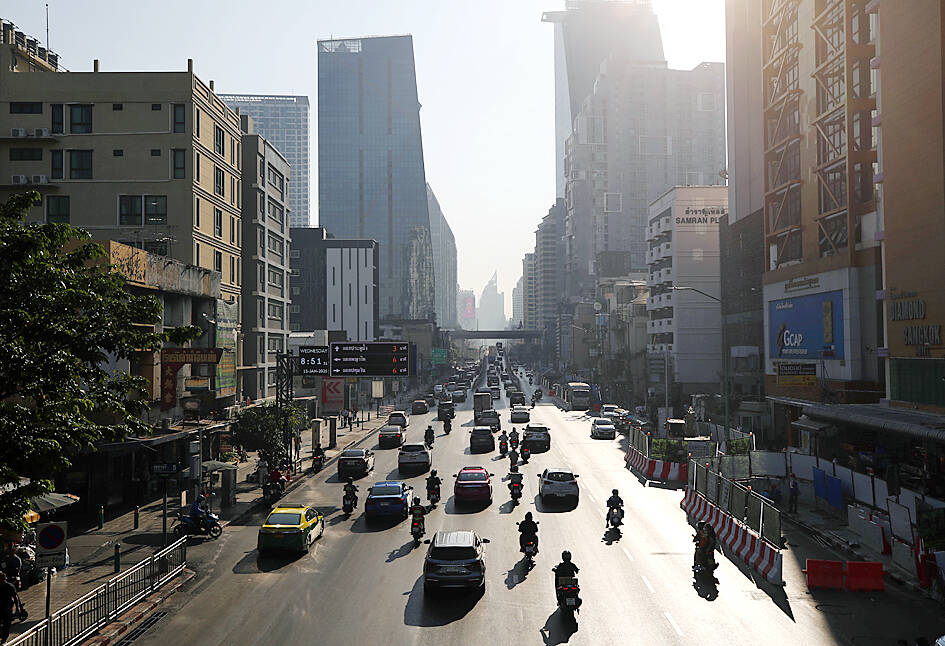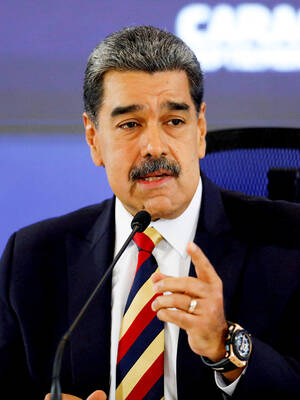Hong Kong officials held rare talks in Bangkok this week with Thai counterparts to find ways to bring home those lured from the Asian financial hub and trapped in illegal work in Southeast Asia, seeking to combat a growing trend.
Tuesday’s talks follow last week’s high-profile case of a Chinese actor believed to have been a victim of human trafficking, who went missing after travelling to Thailand, but was later tracked to Myanmar and rescued.
The UN says border towns in Thailand, Laos and Myanmar have become regional hubs for telecom and other online fraud, with hundreds of thousands trafficked to work in scam centers there.

Photo: EPA-EFE
“There have been signs of a resurgence in the situation where Hong Kong residents are suspected of being lured to Southeast Asian countries and detained to engage in illegal work,” the territory’s government said on Sunday.
Such signs have grown since the second quarter of last year, it added in a statement.
A team led by Hong Kong Undersecretary for Security Michael Cheuk (卓孝業) met Thai police and government officials on Tuesday to help assist with the safe return of Hong Kong residents as soon as possible, it said in a subsequent statement.
Of 28 requests for help from authorities, 16 of the people involved had returned home, while the remaining 12 had “reported restrictions on their movement,” it said.
On Friday last week, China’s embassy in Myanmar urged vigilance by its citizens against telecom and online fraud following reports of compatriots lured to Myanmar’s border town of Myawaddy by online scams that promised “high-paying overseas jobs.”
Most of the trafficking victims hail from Southeast Asian countries as well as Taiwan, China and Hong Kong, but some also from as far away as Africa and Latin America, the UN has said.

‘NEO-NAZIS’: A minister described the rally as ‘spreading hate’ and ‘dividing our communities,’ adding that it had been organized and promoted by far-right groups Thousands of Australians joined anti-immigration rallies across the country yesterday that the center-left government condemned, saying they sought to spread hate and were linked to neo-Nazis. “March for Australia” rallies against immigration were held in Sydney, and other state capitals and regional centers, according to the group’s Web site. “Mass migration has torn at the bonds that held our communities together,” the Web site said. The group posted on X on Saturday that the rallies aimed to do “what the mainstream politicians never have the courage to do: demand an end to mass immigration.” The group also said it was concerned about culture,

CRACKDOWN: The Indonesian president vowed to clamp down on ‘treason and terrorism,’ while acceding to some protest demands to revoke lawmaker benefits Protests in Indonesia over rising living costs and inequality intensified overnight, prompting Indonesian President Prabowo Subianto to cancel a planned trip to China, while demonstrators reportedly targeted the homes of the finance minister and several lawmakers. Rioters entered Indonesian Minister of Finance Sri Mulyani Indrawati’s residence near Jakarta early yesterday, but were repelled by armed forces personnel, Kompas reported. Items were taken from the homes of lawmaker Ahmad Sahroni and two others, according to Detik.com. The reports of looting could not be independently verified, and the finance ministry has not responded to requests for comment. The protests were sparked by outrage over

VENEZUELAN ACTION: Marco Rubio said that previous US interdiction efforts have not stemmed the flow of illicit drugs into the US and that ‘blowing them up’ would US President Donald Trump on Wednesday justified a lethal military strike that his administration said was carried out a day earlier against a Venezuelan gang as a necessary effort by the US to send a message to Latin American cartels. Asked why the military did not instead interdict the vessel and capture those on board, Trump said that the operation would cause drug smugglers to think twice about trying to move drugs into the US. “There was massive amounts of drugs coming into our country to kill a lot of people and everybody fully understands that,” Trump said while hosting Polish President

A French couple kept Louise, a playful black panther, in an apartment in northern France, triggering panic when she was spotted roaming nearby rooftops. The pair were were handed suspended jail sentences on Thursday for illegally keeping a wild animal, despite protesting that they saw Louise as their baby. The ruling follows a September 2019 incident when the months-old feline was seen roaming a rooftop in Armentieres after slipping out of the couple’s window. Authorities captured the panther by sedating her with anesthetic darts after she entered a home. No injuries were reported during the animal’s time on the loose. The court in the